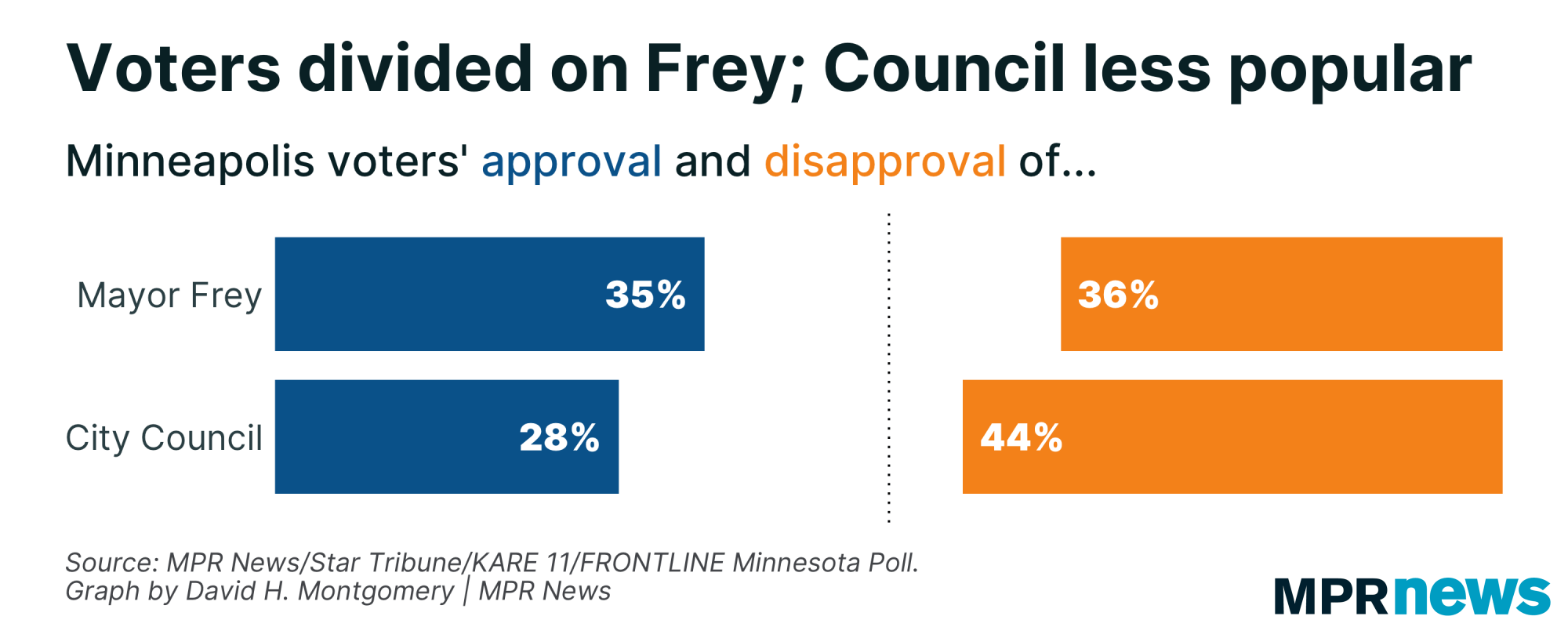Poll: Support for Frey, council split
About a third of Minneapolis voters have a favorable opinion of Mayor Jacob Frey. However, fewer favor the City Council

Go Deeper.
Create an account or log in to save stories.
Like this?
Thanks for liking this story! We have added it to a list of your favorite stories.
As he seeks reelection to a second term during a tumultuous time, only about a third of Minneapolis voters have a favorable opinion of Mayor Jacob Frey, but at the same time many voters favor giving the mayor’s office more power over the city’s daily operations.
The numbers from a new MPR News/Star Tribune/KARE 11/FRONTLINE Minnesota poll show 35 percent of registered voters have a favorable opinion of Frey and 36 percent have an unfavorable opinion, with 29 percent offering no opinion.

Stephanie Cholensky, who is white, said she doesn’t agree with Frey’s political stances and won’t vote for him.
“He's capitulated to the police unions, and he has not prioritized affordable housing,” Cholensky said. ‘There's really not much I'm impressed with when it comes to him.”
Turn Up Your Support
MPR News helps you turn down the noise and build shared understanding. Turn up your support for this public resource and keep trusted journalism accessible to all.
Frey is facing more than a dozen challengers, including strong campaigns from community organizer Sheila Nezhad and former state representative Kate Knuth.
John J. Ursu, who is white and lives in southwest Minneapolis, said he believes Frey is the best candidate for mayor even though he seemed too inexperienced during this first term.
"He just wasn't qualified or equipped to handle what he was confronted with,” Ursu said. “On the other hand, he's smart, I think he's pragmatic, and I think that he learned a lot in the last four years.”
Frey is more popular with Black voters than with white voters — 52 percent of Black voters see him favorably and 19 percent unfavorably.
As low as Frey’s numbers are, the Minneapolis City Council fares even worse, with a favorable opinion from just 28 percent, an unfavorable opinion from 44 percent and 28 percent expressing no opinion.
Ursu said he thought only a couple of the council members were “competent.”
“These are people that respond only to ‘activists.’ They have no concern and really no understanding of how the city should operate,” Ursu said. “They’re indifferent to the neighborhoods and the people that live here.”
Ea Porter, who is Black, said she has favorable views of both the mayor and the Minneapolis City Council, who got low marks from most city voters who were surveyed.
“For any of our leaders, especially during this last 18 months of COVID, everybody was doing the best that they could with what information they had at the time,” Porter said. “So I'm willing to give everybody who at least seemed to step forward with the common good in mind a little grace.”
Voters are split over who they trust more to make decisions about the future of the Minneapolis Police Department, with 40 percent saying the mayor, 42 percent saying the council and 18 percent saying they’re not sure.

Still, a proposal to give the mayor more authority over the city’s daily operations and focusing the city council on legislative work gets the support of 47 percent and opposition from 28 percent with 25 percent undecided. The language of that question mirrors a charter amendment on the November ballot.
Vamsi Grussing said the proposal makes sense, but that he doesn’t feel strongly about it.
“It’s not unusual to see the mayor have full authority,” Grussing said. “Strong mayoral system like St. Paul would be OK, but I don’t mind power splitting, working as a check and balance.”

On another charter question, 46 percent say they support allowing the city council to regulate rent on private residential property while 39 percent oppose it and 15 percent are undecided.
Pamela Kinsey said she supports the rent control measure as a way to hold down rents that seem to be continually rising.
“Hard working people that are making only $12 an hour, they deserve to live good too, and they deserve to live in a better place than what they’re living in,” she said.
The numbers come from an MPR News/Star Tribune/Kare11/FRONTLINE Minnesota Poll of 800 registered Minneapolis voters conducted between Sept. 9-13. The survey has a margin of error of plus or minus 3.5 percentage points.
To get the views of Black voters the pollster interviewed 500 Black Minneapolis voters. Those results have a margin of error of plus or minus 4.5 percentage points.



